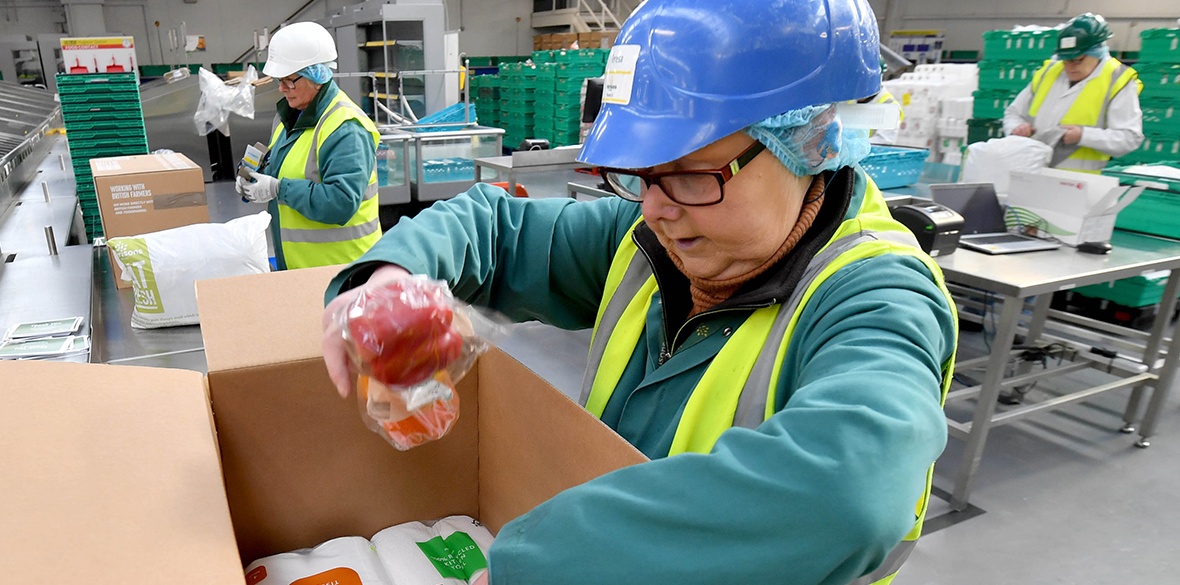This is the last article you can read this month
You can read more article this month
You can read more articles this month
Sorry your limit is up for this month
Reset on:
Please help support the Morning Star by subscribing here
THROUGHOUT the coronavirus crisis, every worker across the food sectors has provided a vital contribution to feeding the nation. Their work has been essential in keeping our country going during this pandemic.
Yet despite working day and night, seven days a week, 52 weeks a year and across the length and breadth of the country, many food workers are shamefully being priced out of the very products they produce.
The cause of the country’s food poverty scandal is not a lack of food to go round.
It is because of a broken, failing and quite literally deadly economy, which Covid-19 has exposed. As shown by the fact the poorest and the low paid are two-and-half times more likely to die from the virus.
Imagine being a worker feeling you must go to work no matter what. Where there is a built-in perverse incentive to go to work as you quite simply cannot afford not to, knowing you do not get sick pay and where statutory sick pay is so measly.
At the same time another shocking reality is that all too often the workforce producing food (and so many other low-paid workers) are paid so little that they often struggle to cover their own weekly food bill.
We think this is fundamentally wrong and exposes how the value and important role key workers, including food workers, play in society not being reflected in the pay and conditions of far too many workers.
My union, the Bakers, Food and Allied Workers Union (BFAWU), is fighting to end the scourge of food poverty in communities and workplaces across the country by challenging low pay and demanding the right to food be enshrined in law.
Amid a pandemic which has brought the hidden struggles of many to the fore, the time is right to make that case for the right to food to be realised by all.
We want to make sure food is healthy, safe to eat and fairly produced by well-paid and protected staff throughout the food sector.
To help force that change, it’s vital the public understand the journey their food takes from production to plate, so this week we have launched a new study to highlight the impact of food poverty within the food sector.
The research asks food workers how the coronavirus crisis has affected their household’s access to food, including whether they have had to sacrifice food for themselves to feed others in the household.
This study will help to tell the true stories of the people who have given so much to feed the country, but themselves may be struggling to feed their own family.
The fight to increase pay is not an especially new one for a trade union. We are proud to fight for our members in relation to pay and food.
But let’s be clear — fighting to end food poverty should not have to happen in 21st-century Britain.
It speaks to a country that is failing too many people and an economy that is working only for a few.
Food poverty and hunger have been on the rise since the vicious Tory austerity started in 2010.
However, it is a subject which has recently gathered more public attention through the rise in reliance on foodbanks and the continued uncertainty over free school meals during lockdowns being challenged by the likes of Marcus Rashford.
Importantly, it is an idea that socialist politicians are championing in Parliament too — work is being led in Westminster by Ian Byrne MP and in the Scottish Parliament through the private member’s Bill lodged by Elaine Smith MSP.
Included in the key elements of the proposal from Smith are that her Bill would require the Scottish government to check its policies and performance in meeting the right to food.
It would also mean the Scottish government can be held accountable for any regression or failure to meet its right to food obligations.
Legislation such as this would be a game-changer in fighting food poverty.
And the need for that couldn’t be greater.
Recent statistics on food parcel distribution revealed that the scale of foodbank use is far higher than previously estimated.
Between April and September 2015, the Trussell Trust distributed 506,369 emergency food parcels across the UK.
In the same period during 2020, that figure stood at 1,239,399 emergency food parcels distributed by the Trussell Trust Network, an increase of around 145 per cent.
Just think how we might be able to guarantee a real living wage as the actual minimum wage if governments were required by law to deliver on the right to food.
Or the fundamental shift it could make to the broken universal credit system with its delays and sanctions — both of which are proven barriers to access necessities like food.
I am proud that my union and our members are on the front line of the fight to secure a right to food in law.
For over 175 years our union has been standing up for food workers to get an equitable wage for the work that they do.
And throughout that time our members have also been fighting to address injustices that affect society as a whole.
As our campaign for the right to food goes on, I am sure the workers who produce the food to feed our nation, will working with others help deliver the change in the law to end food poverty in the country too.
Sarah Woolley is the general secretary of the Bakers, Food and Allied Workers Union (BFAWU). Follow her on Twitter @sarahwoolley01.












